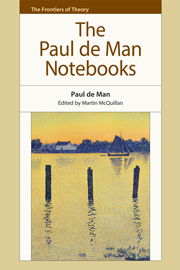Book contents
- Frontmatter
- Contents
- Series Editor's Preface
- Acknowledgements
- Dedication
- Introduction: ‘The Unimaginable Touch of Time’: The Public and Private in the Notebooks of Paul de Man
- PART I Texts
- 1 The Drawings of Paul Valéry (1948)
- 2 Jacques Villon (1952)
- 3 Graduate Essay on Keats (1954)
- 4 Postdoctoral Essay on Symbolism (c. 1960)
- 5 Introduction to Madame Bovary (1965)
- 6 Introduction to The Portable Rousseau (1973)
- 7 On Reading Rousseau (1977)
- 8 Translator's Introduction to “Rousseau and English Romanticism” (1978)
- 9 Rousseau and English Romanticism (1978)
- 10 Introduction to Studies in Romanticism (1979)
- 11 Hommage à Georges Poulet (1982)
- 12 A Letter from Paul de Man (1982)
- 13 Reply to Raymond Geuss (1983)
- 14 Interview with Robert Moynihan (1984)
- PART II Translations
- PART III Teaching
- PART IV Research
- Appendix. The Notebooks of Paul de Man 1963–83
- Bibliography
- Index of Names
12 - A Letter from Paul de Man (1982)
from PART I - Texts
Published online by Cambridge University Press: 05 December 2014
- Frontmatter
- Contents
- Series Editor's Preface
- Acknowledgements
- Dedication
- Introduction: ‘The Unimaginable Touch of Time’: The Public and Private in the Notebooks of Paul de Man
- PART I Texts
- 1 The Drawings of Paul Valéry (1948)
- 2 Jacques Villon (1952)
- 3 Graduate Essay on Keats (1954)
- 4 Postdoctoral Essay on Symbolism (c. 1960)
- 5 Introduction to Madame Bovary (1965)
- 6 Introduction to The Portable Rousseau (1973)
- 7 On Reading Rousseau (1977)
- 8 Translator's Introduction to “Rousseau and English Romanticism” (1978)
- 9 Rousseau and English Romanticism (1978)
- 10 Introduction to Studies in Romanticism (1979)
- 11 Hommage à Georges Poulet (1982)
- 12 A Letter from Paul de Man (1982)
- 13 Reply to Raymond Geuss (1983)
- 14 Interview with Robert Moynihan (1984)
- PART II Translations
- PART III Teaching
- PART IV Research
- Appendix. The Notebooks of Paul de Man 1963–83
- Bibliography
- Index of Names
Summary
In May 1981 we [the journal Critical Inquiry] invited Paul de Man to reply to Stanley Corngold's essay, “Error in Paul de Man.” We received the following letter.
You generously invited me to reply to Stanley Corngold's essay, a somewhat ambivalent assignment since I can hardly feel to be “addressed” by a discourse which, as is so often the case, addresses its own rather than my defenses or uncertainties. But since the tone of the essay suggests indictment rather than dialogue, and since the only alternative thus left to me is a plea for mercy, I welcome the opportunity to set the record straight on one specific point: the Nietzsche passage which is offered as the main exhibit to establish probable cause of my guilt.
I am grateful to Stanley Corngold for having pointed out a polarity (error/ mistake) that I have not explicitly thematized in these terms. If “mistake” is random and contingent (of the order of “can” or “may”) and “error” is systemic and compulsive (of the order of “must”), then I have stated, in a variety of terminologies, the impossibility of ever coming to rest on one or the other side of this distinction. I suppose the most sustained attempt to work out the problem is in the reading of a section of Nietzsche's posthumous fragments in my Allegories of Reading (chapter 6), in which “can” is opposed to “must.” But the gesture certainly recurs, contingently as well as compulsively, all too frequently.
- Type
- Chapter
- Information
- The Paul de Man Notebooks , pp. 134 - 138Publisher: Edinburgh University PressPrint publication year: 2014



